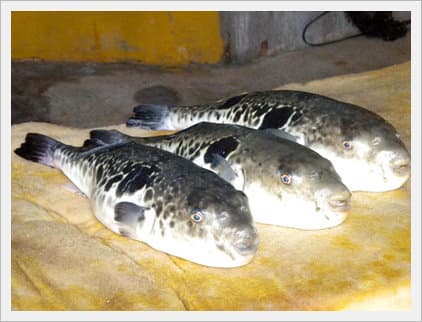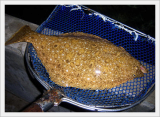Takifugu Rubripes(Temminck Et Schlegel)
Negotiable Min Order Quantity Unit
- Required Quantity
-
- Place of Origin
- Payment Terms
- Negotiable
- Production method
- Negotiable
- Shipping / Lead Time
- Negotiable / Negotiable
- Keyword
- takifugu rubripes
- Category
- Seafood
Ceter Trade Co., Ltd.
- Country / Year Established
-
 South Korea
/
South Korea
/
- Business type
- Others
- Verified Certificate
-
17


| Product name | Takifugu Rubripes(Temminck Et Schlegel) | Certification | - |
|---|---|---|---|
| Category | Seafood | Ingredients | - |
| Keyword | takifugu rubripes | Unit Size | - |
| Brand name | - | Unit Weigh | - |
| origin | Stock | - | |
| Supply type | - | HS code | - |
Product Information
Characteristics of Takifugu rubripes
(1) Physical Features
- Color of back is deep black and, belly is white. There are large black spots surrounded by white in upper end of pectoral fin and bottom of dorsal fin. Then again small, irregular-shaped black spots behind large spots located backside of pectoral fin.
- Dorsal, pectoral, and caudal fin are black while anal fin is white.
- Egg-shaped body. Covered with small spines starting from the middle of forehead to the beginning point of dorsal fin, and from the bottom of nostrils to the front of anus in the belly. The other part is smooth.
- Dorsal and anal fins are close to triangular shape and the end part is round.
- Edge of pectoral and caudal fins end is vertical-shaped and slightly convex.
- Jaw teeth look like birds' beaks as right, left teeth closed tightly each other.
(2) Ecological Characteristics
Range: East/West/South Sea of Korean peninsula, South of Hokkaido of Japan, Yellow Sea, East China Sea.
Habitat: In sandy gravel or quicksand floor in the bottom sea waters.
Migration: A group, staying in the west coast of Korean peninsula in summertime, migrates to the center of Yellow Sea in September and October. After that, it trips southwards to the western sea area of Jejudo after December, then moves more southward to the southern sea of Jejudo for wintering in January, and moves north when spring comes.
Spawning: Spawning period is from March to May. The Spawning point is the entry of gulf coast where water depth is about 20m to the sea floor with sand, gravel, stones, and rocks. Normally most female of 4-year-old (45cm of full length) starts laying eggs while some female start from when they become 3-year-old (from more or less 40cm of full length). Male becomes mature one year earlier than female. Number of incubated eggs is about 1.5 million in case full length is 54cm.
Grown-up: After hatching, becomes 25.0cm after one year, 32.3cm after 2 years, 42.5cm after 3 years, 47.6cm after 4 years, and 52.5cm after 5 years. Adult length 75cm. Life expectancy 10 years.
Taste: Eating small fish when young. Then eating shrimps, crabs, and squids, etc., and after that shrimps, crabs, and fish when grown up. Never eats below 15 degrees Celsius of seawater temperature. Hiding themselves in sand of the bottom floor below 10 degrees Celsius of seawater temperature.
Toxicity: Depends on species, seasons, and, ranges. Normally flesh and skin are not poisonous while internal organs like ovary and liver have strong poison.
Others: It is the most delicious among same species, and expensive.
B2B Trade
| Price (FOB) | Negotiable | transportation | - |
|---|---|---|---|
| MOQ | Negotiable | Leadtime | Negotiable |
| Payment Options | Negotiable | Shipping time | Negotiable |
- President
- LEE, CHANG-YOON
- Address
- 390 Ido-2dong, Juju-siJeollanam-do,
- Product Category
- Other Seafood
- Company introduction
-
Jeju flounder, turban shells, marine algae, and some processed seafood products have been dominating Jeju's seafood export items, however, according to Jeju Special Self-Governing Province, recently farmed globefish(Takifugu rubripes) and even Chujado mackerels have been exported to Japan, which generated great expectations for diversification of exporting items and strengthened the price structure of the local market as well.
Farming of globefish firstly started in 2003 to develop a replacement of Jeju flounder when its price dropped (7,000~8,000 Korean Won/kg) at that time. Farmed globefish was shown in domestic market then, however, it seems to be exported soon as it has recently secured new buyers from Osaka, Japan. At present, 3 Jeju companies(including Tamra Maritime and Fisheries) are farming more or less 150 tons(500g~1.2kg) of globefish, which has been exported up to 31 tons, amounted USD528,000 by the end of November, 2010. Export price is around 20,000 Korean Won per a fish of 800~900g.
In Japan, most of Globefish is consumed in winter time, from October to February of next year, and over 95% ( more or less 2,000 tons) is China-import, however, Jeju's farmed globefish seems to have a bright future in Japanese market as it is farmed environmentally friendly like Jeju flounder, and is in the better position for transportation into the market than China, according to export company's(Center Trading) analysis.
November, 2003 Awarded "Export Trophy of USD One Million" in Trade day.
June, 2004 Awarded "Excellent Smallmedium-sized Companies of Jeju" -Export division.
November, 2004 Awarded "Export Trophy of USD Five Million" in Trade day.
November, 2004 Awarded "Prime Minister's commendation" to C.E.O.
February, 2010 Renamed to Center Trading Co., Ltd. of an Agricultural Corporation.
November, 2010 Selected as Support Company for commercialization of fishery exports by Korea Agro-Fisheries Trade Corp.
- Main Markets
-
 Japan
Japan
- Main Product
Related Products
Roast Kimbap Laver
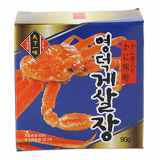
Canned Crab Sauce Mixed with crab meat
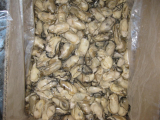
FROZEN OYSTER MEAT(I.Q.F)

Crispy Seaweed
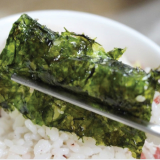
Seasoned laver


































